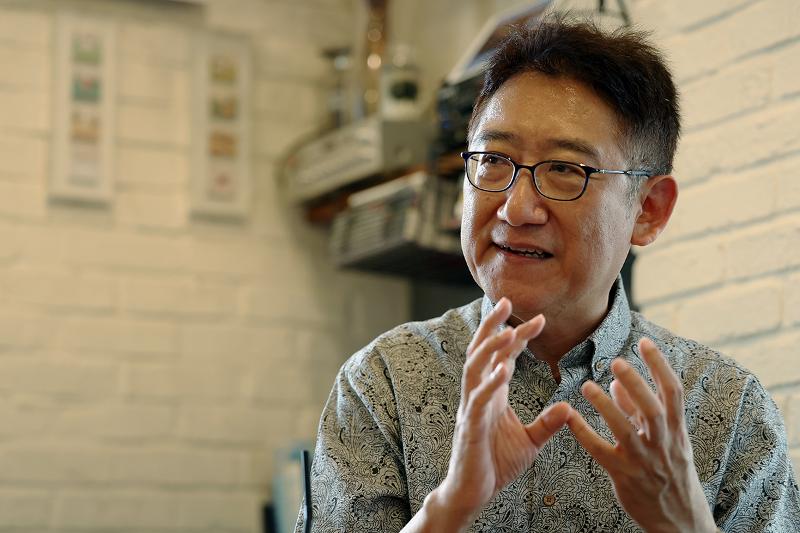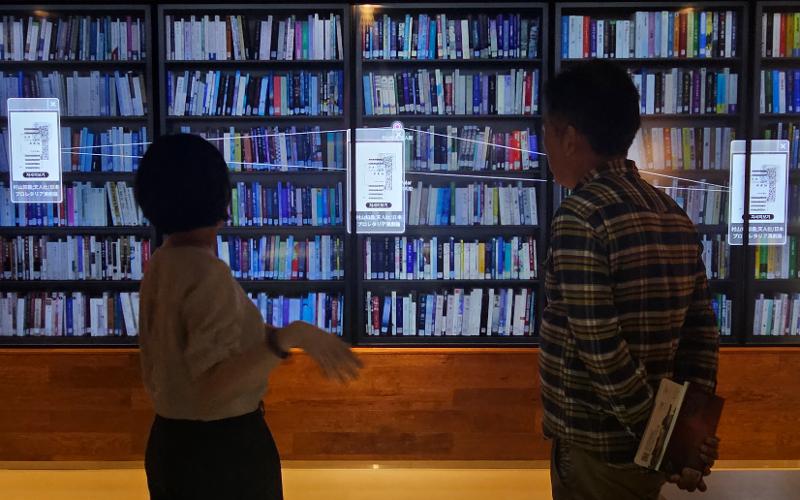
Yong Shu Hoong, director of the Singapore Writers Festival, on Sept. 9 talks about boosting literary cooperation with Korea at a cafe in Seoul's Jongno-gu District. (Lee Jun Young)
By Margareth Theresia and Yoon Sojung
"Collaboration between writers festivals of Singapore and Korea."
This is how Yong Shu Hoong, director of the Singapore Writers Festival, envisions reinforcement of literary cooperation between his country and Korea.
During his first visit to Korea from Sept. 6-11, Yong and staff of the Seoul International Writers' Festival and domestic publishers discussed bilateral exchange and cooperation in literature.
The award-winning poet won the Singapore Literature Prize in 2006 and again in 2014. Still, he called himself a "self-taught accidental poet" because he majored in computer science and taught himself poetry without a "formal background" in literature.
Yet this background, he said humbly, allows his fans to find his poems refreshing and unconventional because his work is not influenced by particular styles.
Yong said science and literature "need not to be kept separate," adding that this topic will be covered in the Singapore Writers Festival slated for November.
"Korea is the subject of the 'Country Focus' program at this year's festival," he said. "I hope for more Korean literary works to be translated and introduced in Singapore."
The following are excerpts of the Sept. 9 interview with the director at a cafe in Seoul's Jongno-gu District.
How did you, a computer science and business major, pursue poetry for a living?
I studied computer science at university. One day when I was programming with my friends, we started to type our chats on an electronic bulletin board in a chat space of a computer messaging system. I realized that I could post my writing on it. In 1992, when I went to the U.S. to study for my MBA, I found an ad for a group of people interested in writing. I joined them and rediscovered the joy of writing poems.
I am a "self-taught accidental poet." Because I have a computer science degree, I might look at certain computer terms and try to appropriate them for use in poetry. For example, the word "cloud" is something we all know but it means something else in the IT sector. This way, I apply tech terms to poetry, something that becomes quite interesting. So what I do is to look at technical terms that I can incorporate into my poetry.
What about your works do you think won you two Singapore Literature Prizes?
It's hard for me to say because as a writer, once I've written something, I let others appreciate and judge it. But maybe I tend to write simply but also things with many layers to discover. Maybe there's also a sense of humor that makes it approachable and not so complicated and difficult to understand. Maybe that way, they seem to find my work refreshing.
How will this year's Singapore Writers Festival differ from previous editions?
I took over as festival director in early January, so at this year's event, I'll show more of my style and thinking compared to the previous director through talks on technology's effects on literature, writing and our lives. So for example, the talks might cover artificial intelligence (AI) and its impact on literature and writing moving toward the future. We will also deal with feminism and youth and take a closer look at female American scientist and bestseller writer Cat Bohannon.
What plans do you have for literary collaboration with Korea?
Korea is the program's "Country Focus" this year. We invited three Korean writers to the event, including translator and writer Anton Hur. Hur also has close ties with Shanna Tan, a Singaporean translator who translates Korean literature. You'll find another interesting connection between both countries through them. I hope that more Korean literary works are translated for Singaporean readers.
I hope to collaborate and discuss with people from the Seoul International Writers' Festival. We could think of inviting writers from both countries. So I wish to meet and invite many Korean writers and gain a better understanding of this nation's culture.

Yong Shu Hoong (right), director of the Singapore Writers Festival, on Sept. 10 is briefed on a digital archive system using AI at the National Library of Korea in Seoul's Seocho-gu District. (Ministry of Culture, Sports and Tourism)
margareth@korea.kr
Most popular
- Slew of festivals, events scheduled in downtown Seoul in May
- Actor Tom Cruise proves 'love for Korea' with 12th visit
- Netflix releases official trailer for final season of 'Squid Game'
- Jeju Island completes prep to host series of APEC meetings
- Korea Day celebrated at Osaka-Kansai World Expo in Japan
